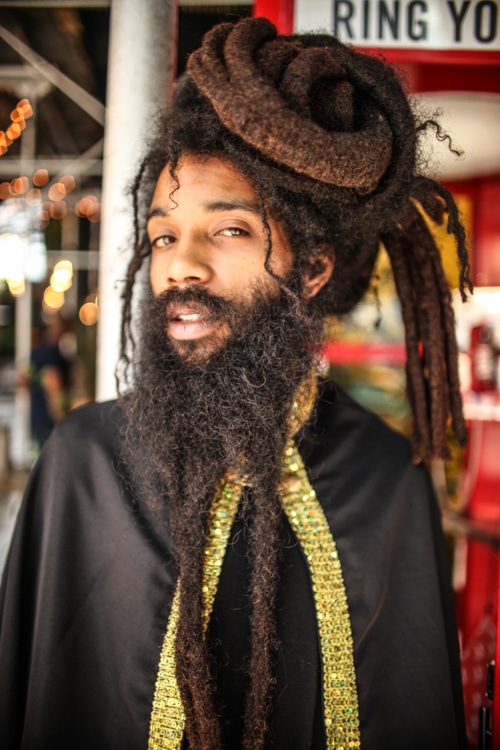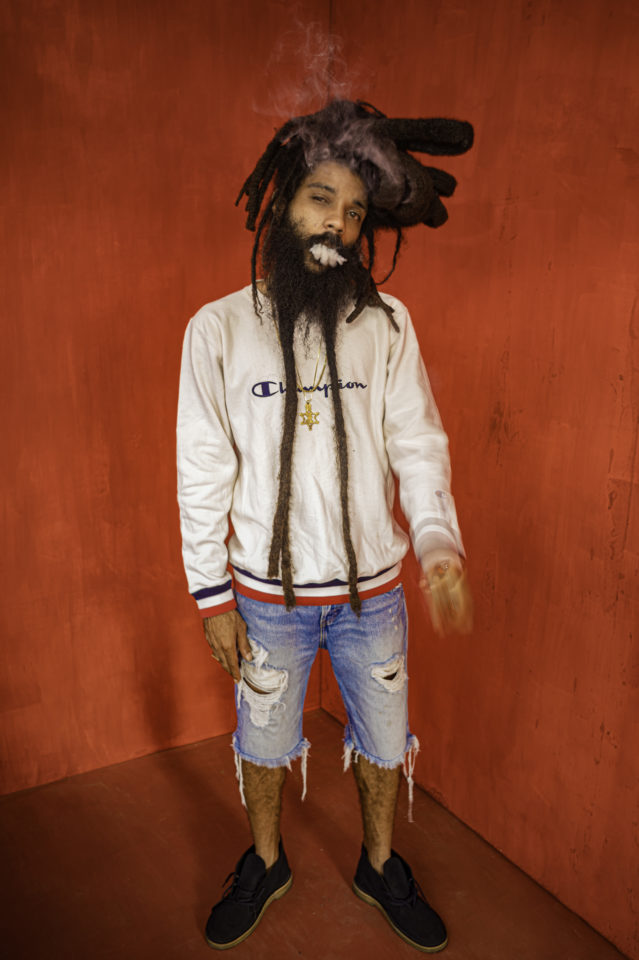As a DJ, Yaadcore helped break acts like Chronixx and Protoje, ushering in the conscious, reggae revival movement that swept Jamaica over the last decade. These days, he’s focused on making his own tunes, dropping postmodern island bangers like “Ready Now” and “The Calling” through his 12 Yaad label and California’s Delicious Vinyl Island.
With his debut album, Reggae Land, primed for a January 2022 release, his transformation from DJ to artist is set to be complete.
No matter which musical cap Yaadcore is wearing, advocating for the herb is a part of his DNA. Whether blazing chalice in the DJ booth, reviewing strains for Jamaican dispensary Itopia Life, or remaking John Holt’s classic ganja farmer anthem “Police in Helicopter” (alongside Jah9 and Subatomic Sound), he’s one of Jamaica’s most visible and authentic ambassadors for the lifestyle. This is Jamaica we’re talking about, so that’s really saying something.
Originally released in 2020, Yaadcore’s “Nyquill” draws on reggae’s holy history of marijuana protest tunes to highlight cannabis’ medicinal properties, and the ways Babylon continues to fight the plant even as dispensaries proliferate from Kingston to MoBay. A new remix of the track, re-branded with the additional title “Spliff A Light Spliff,” is out today featuring reggae legend Richie Spice, and we’ve got an exclusive premiere of the video right here.
High Times spoke to Yaadcore about “Nyquill,” making the transition from DJ to artist, and the ways legalization has and hasn’t changed Jamaica’s celebrated ganja business.
What was the inspiration for “Nyquill”?
Really and truly, this is what the riddim spoke to me. Most times, songs just come to me. [Reggae artist] Micah Shemiah had [an instrumental] riddim called Lion of Judah he was gonna voice up a few more songs on, and I said I wanna try something on it. There is the popular Big Pharma brand, NyQuil, and I used that to show that marijuana is our medication and compare the medicinal values that marijuana has.
Why did you add “Spliff A Light Spliff” to the title?
“Spliff A Light Spliff” was already a part of the hook. Being that we are remixing the song with a herbalist legend, Richie Spice, I emphasized the chorus more. After the original dropped, I did a “Spliff a Light Spliff” strain review series on YouTube with Itopia Life, a dispensary here in Kingston, which we want to continue.
You’ve got “Spliff a Light Spliff” merch drops with Diamond Supply Co. and Blazy Susan, two American companies. Do you see yourself becoming a global spokesman for Jamaican ganja?
Jamaica has a big reputation where marijuana is concerned… for having the best. That goes along with reggae music [being] an avenue for advocating for marijuana to be free. With these collaborations, we see where we can cross market to different people who are not as familiar with reggae culture but share the same sentiment when it comes to the advocacy of marijuana.
I am definitely a voice advocating not only for Brand Jamaica where herb is concerned, but a global voice, you know. As [I say] in the song, “Babylon should never wah lock up anyone for just a little draw.” There are still people around the world faced with jail time just because [of] a little spliff.
In 2015, the Jamaican government significantly amended its cannabis laws. How have attitudes towards ganja in Jamaica changed since then?
Before 2015, there was more tension between police and smokers. [Now] you can smoke freely without thinking about getting arrested. That is a big improvement we have to give thanks for. [At] the same time, farmers are still faced with high licensing fees.
Small farmers are not able to gather the right documents to be a part of this industry, and they are faced with penalties if they continue to grow. They don’t really get to benefit after how many years of maintaining the industry, and being oppressed for it. People with criminal records just for possession of marijuana are still faced with their criminal charges affecting their status in society.

Talk about why you set the “Nyquill (Spliff A Light Spliff)” video in a greenhouse.
A typical ganja video is in a ganja field, breeze blowing. I always want to be different. It was my intention to showcase the level of farming that has developed in Jamaica. I was scouting different farms for the video, and when Blaine from Itopia Life sent me a pic of his farm, the setup was very impressive for Jamaica. [The choice of location] was aesthetic and political.
Growers in Jamaica have always done their own thing and left well enough alone, and it’s served their reputation well. How is the island beginning to embrace the technological advances that have revolutionized the industry overseas?
America is blessed with a lot of resources. Scientists and farmers are way more educated in a technological sense. Whereas a Jamaican farmer, being we are a country of nature, we more deal with that kind of farming. As technology develops in farming all over, not just in marijuana, dem start use techniques to identify what strain is in each herb, and modify the seeds to be more specific as far as strain is concerned.
Since the whole legalization in Jamaica now, naturally we see some development in how we plant the herb. Naturally, we’re learning from what we see abroad as well as applying our own Jamaican knowledge. A farmer from California may come to Jamaica and not be able to plant the same crop as he could in California. You have to get used to the different climate and humidity, [whether] you’re growing outdoors or in a greenhouse.
How we now start to develop our thing is by importing seeds and learning to crossbreed different strains. The mere fact that it has become legal now, people can experiment more freely in the industry.
You were a DJ for a long time, touring with Protoje, making mixtapes, and platforming the reggae revival with your event, Dubwise Jamaica. How did your journey to becoming an artist begin?
There is a style in reggae where they play the song and then the [instrumental] riddim version. I remember one night, I was DJing in Bergamo, Italy, with Protoje, and I played a song, and the riddim as well, and people were saying, “Sing a song, sing a song!” I was really unable at that time.
I wanted to be able to toast as well when playing a rhythm live, so that was my first inspiration to become an artist. Then I discovered Mikey Dread. I knew of him already, but he resonated in my mind after that. He was the first DJ to have a reggae radio show in Jamaica; he was a producer and an artist as well. I saw that I don’t have to limit myself.
“Ready Now” was the first song I put out. That song was not planned. It was mystical. A producer sent me the riddim to co-produce, and probably voice some other artist. It was playing one day at the studio and man dem said, Ready Now—they were ready to start—and immediately mi start sing, “Say mi Ready Now…” I wrote the hook in five minutes and, a couple months after, I released it.
That’s how the journey started. It was the third song I ever wrote, but I released it first, to send a statement that I’m ready now. I was already sure of what I wanted to do by that time.

How does the herb unleash your creativity?
It unleashes creativity by making me feel relaxed. Once the nerves are relaxed, you are able to channel what the mind is really focused on.
What are you looking forward to sharing with your debut album?
Mi want people to see the energy mi have set out for the world, transitioning from a DJ to an artist. To make the people know it’s not a joke ting. I’m not really a DJ anymore. I have a whole heap of material to share with the world.
How would you describe your music? There’s a lot of hip-hop influence. It’s definitely not your father’s reggae sound.
There are some fusions in it, but the foundation of what mi a deal wid [is] reggae music. From you hear I and I ‘pon it, then you know it ah go bring Jamaican flavor.
Follow @yaadcore and check out yaadcoreradio.com for updates and info.
The post Yaadcore is Ready for His Spotlight Now appeared first on High Times.
